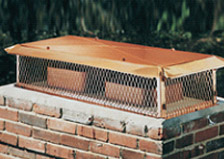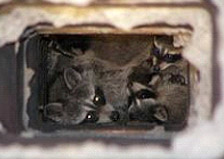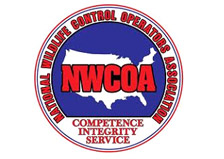


Boston Raccoon Control
Raccoons are omnivores and will eat a wide range of plants and animals. Raccoons do not hibernate, but they do live in dens and become inactive during severe winter weather.
Raccoons are a major host of rabies in the U.S., especially here in Massachusetts where their populations are on the rise again. Raccoon feces can contain dangerous sometimes deadly organisms like raccoon roundworm.
Raccoons can cause serious damage around homes and buildings, especially when they try to enter through soffits, attics or chimneys. These are common den sites.
If you suspect a raccoon has gained access into your building or attic, call our wildlife professionals 24/7
Our Raccoon Control Methods and Services
- Trapping and Removal
- Exclusion Work
- Chimney Capping & Access Covers
- Custom Raccoon-Proof Trash Enclosures
- Tree and Branch Modification
- Hazardous Dropping Removal
- Attic Restoration
- Emergency Raccoon Control Service 24/7
Preventing Raccoon Problems
The following tips can help people live with and enjoy wildlife ,including raccoons, responsibly. Remember that your behavior affects the behavior of wildlife.
Secure your garbage and compost- Raccoons will happily raid garbage cans and compost heaps. Make sure garbage is kept in tightly closed containers. Take out trash on the morning of pick-up instead of the night before. Keep compost in secure vented containers to prevent access to this attractive food source. These practices prevent artificial feeding of raccoons and also makes your area less attractive to them.
Do not feed or try to touch raccoons- Raccoons are wild animals and feeding, whether directly or indirectly, may cause them to lose their fear of people. Raccoons which become habituated (used to people) may approach other humans expecting food or attention. This is not safe for animals or people.
Feed pets indoors- Do not put pet food outdoors under any circumstances. Pet food left outdoors inadvertently feeds a variety of wildlife including raccoons. Causing raccoons to congregate at a feeder can also facilitate the spread of disease from raccoons to other wildlife or domestic animals.
Hire a Professional to eliminate potential den sites- Achieved by closing off openings under porches and buildings. Seal any openings that lead into sheds or attics and cap off chimneys.
Share this information with your neighbors! Your best efforts will be futile if neighbors are providing raccoons with food and shelter.
Ultra Safe Pest treats each case individually. Raccoons can be dangerous animals to come in contact with. Only qualified wildlife professionals should attempt to remove, handle, or trap problem raccoons. Our goal is to address the problem animal and implement a plan of action to prevent future wildlife conflict.
Greater Boston Area: Allston/Brighton, Cambridge, Somerville, Newton, Brookline, Malden, Medford, Chelsea, Revere, Everett, Charlestown, Dorchester, Milton, Roxbury, Mattapan, Jamaica Plain and surrounding areas.
North Shore Area: Middleton, Lynn, Saugus, Peabody, Salem, Beverly, Gloucester and surrounding areas.
Metro North Area: Lowell, Lawrence, Haverhill, North Andover, Wilmington, Woburn, Burlington, Lexington and surrounding areas
South Shore Area: Quincy, Braintree, Hingham, Plymouth, Cape Cod and surrounding areas
Metro South Area: Canton, Brockton, Taunton, Norwood, Westwood, Fall River, New Bedford and surrounding areas
Metro West Area: Framingham, Needham, Natick, Marlborough, Westborough, Southborough, Worcester, Springfield, Western Ma and surrounding areas






